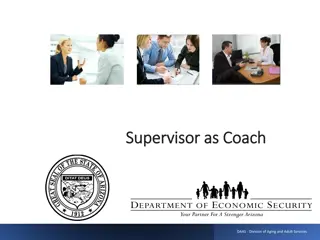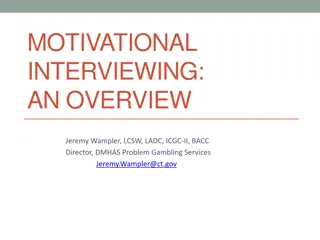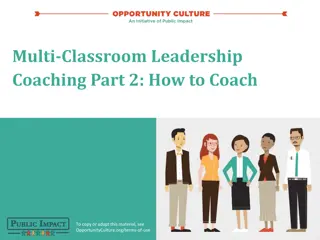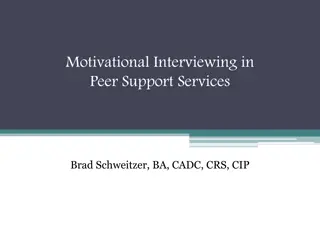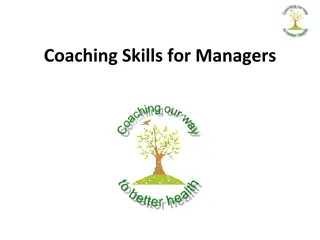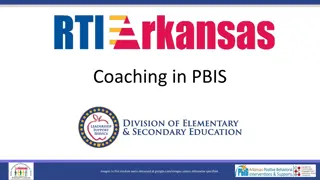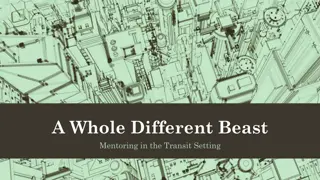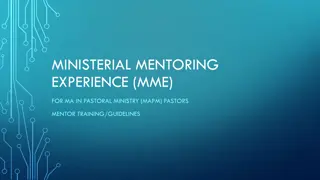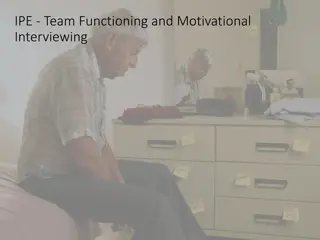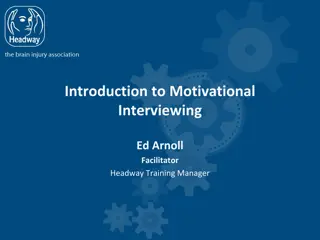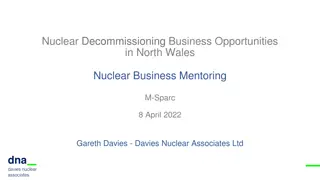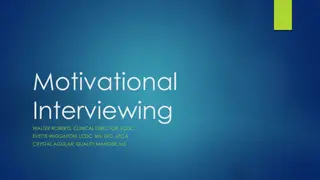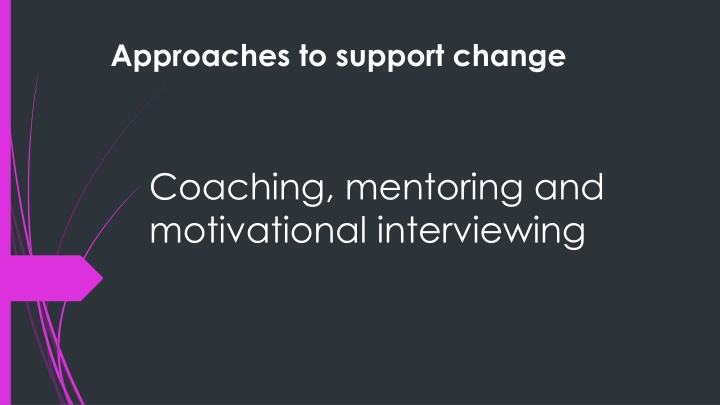
Supporting Change: Coaching, Mentoring, and Motivational Interviewing Overview
Learn about coaching, mentoring, and motivational interviewing as effective approaches to support personal and professional development. Coaching focuses on improving work performance through structured sessions, while mentoring emphasizes long-term support and development. Motivational interviewing aims to inspire positive changes in behavior. Understand the differences and benefits of each approach to drive successful transformations.
Uploaded on | 2 Views
Download Presentation

Please find below an Image/Link to download the presentation.
The content on the website is provided AS IS for your information and personal use only. It may not be sold, licensed, or shared on other websites without obtaining consent from the author. If you encounter any issues during the download, it is possible that the publisher has removed the file from their server.
You are allowed to download the files provided on this website for personal or commercial use, subject to the condition that they are used lawfully. All files are the property of their respective owners.
The content on the website is provided AS IS for your information and personal use only. It may not be sold, licensed, or shared on other websites without obtaining consent from the author.
E N D
Presentation Transcript
Approaches to support change Coaching, mentoring and motivational interviewing
Coaching, mentoring and motivational interviewing What are they?
Coaching - An intent to improve performance at work through a facilitative relationship between a coach and an individual. - There is often a focus on specific personal and organisational goals which result in action that has been determined by that individual. - The coaching relationship tends to be short term with a specific start and end date.
- Coaching often involves a formal structured approach with meetings scheduled on a regular basis where specific developmental goals are agreed between the individual and their coach. - May rely on processes such as performance management systems, strategic and operational plans and feedback from the individual s one to one and appraisal meetings. - The individual s manager might be involved in the coaching process either directly or indirectly because they have a vested interest in the individual s enhanced performance.
- The coach may be external to the organisational environment coming into the setting solely to coach, on a formal contract between the coach and the organisation which includes payment for services. - If external, the coach is often expected to be neutral, leaving the individual and the organisation when their contract for services has ended. (Association for Coaching, 2004; Law, 2013; Management Mentors, 2013)
Mentoring - There is a focus on a mentor acting as a critical friend to an individual in an organisation to further their personal and professional development - The mentor is often senior to, or more experienced to the individual being mentored in terms of their knowledge, skills and experience. - The mentoring relationship can be long term.
- Meetings are more informal, taking place as and when required, as identified by the individual being mentored. - This role tends to be less goal focused, but instead, it seeks to enhance the mentee s professional development as a whole. - Focus is primarily on personal and professional development.
- The mentor and mentee are often based in the same organisation and so they have a shared understanding of the context in which they work - However, the individual s manager might not be their mentor and they may only be involved indirectly. - How many of you now have a mentor? What has been your experience? (Ives, 2008; Connor and Pokora, 2012; Law, 2013; Management Mentors, 2013; Gray et al. 2016;Chartered Institute of Personnel and Development, 2017)
Motivational Interviewing What is it? A client centred counselling style for prompting behaviour change and to resolve ambivalence Goal style of communication paying particular attention to the language of change Intended to produce rapid, internally motivated change by mobilising the client s own change resources
A video on motivational interviewing The following video demonstrates the basics of MI. It s worth noting that originally the actor was only asked to play the role of the patient attending for a medication review however just before the start of the review the actor was asked if he minded if the practitioner raised the issues of his weight watch how the practitioner handles this. There is a free online MI course available from the BMJ https://learning.bmj.com/learning/module-intro/motivational- interviewing.html?moduleId=10051582
https://www.youtube.com/watch?v=bTRRNWrwRCo&feature=emb_titlehttps://www.youtube.com/watch?v=bTRRNWrwRCo&feature=emb_title
Managing resistance to change The essence of coaching is that as a coach, you work with an individual so that they take ownership of a challenge (e.g. a change that is unwanted or difficult to deal with) and how to resolve it.
The GROW model The GROW model is one example of a coaching technique used to have a different type of conversation where as the coach, you put the individual in control, reducing conflict as you sit alongside them as opposed to opposite them (metaphorically and perhaps literally). (Sabine and Eldridge, 2003)
The GROW model Goal (What do you want to achieve or agree your action to be?) Reality (What is happening to you right now?) Options (What are your options for getting to your goal?) Way Forward (What are you going to do next?)
The GROW model You will now have an insight into using the GROW model as a coaching technique
References Association for Coaching (2004) Guidelines for coaching in organisations. Available at: http://c.ymcdn.com/sites/associationforcoaching.site- ym.com/resource/resmgr/Articles_&_Handy_Guides/Organisations/Handy_Guides/Guidelines_f or_Coaching_in_O.pdf (Accessed: 28 January 2019). CIPD (2018) Coaching and mentoring. Available at: https://www.cipd.co.uk/knowledge/fundamentals/people/development/coaching-mentoring- factsheet (Accessed: 28 January 2019). Connor, M. and Pokora, J. (2012) Coaching and mentoring at work. 2nd edn. Maidenhead : McGraw-Hill/Open University. Gray, D., Garvey, B. and Lane, D. (2016) A critical introduction to coaching and mentoring. Los Angeles; London; New Delhi; Singapore; Washington; Melbourne: SAGE
References Ives, Y. (2008) What is coaching ? An exploration of conflicting paradigms. International Journal of Evidence Based Coaching and Mentoring, 6 (2) pp. 100-113. Law, H. (2013) The psychology of coaching, mentoring and learning. Second edition. Malden, MA: John Wiley & Sons Inc. Management Mentors (2013) Coaching vs mentoring: 25 ways they re different. Available at: https://www.scribd.com/document/169917659/Coaching-vs-Mentoring-25-Ways-They-Re- Different (Accessed: 28 January 2019). Sabine, D. and Eldridge, F. (2003) Beyond GROW:A new coaching model) , The International Journal of Mentoring and Coaching, 1 (1).



